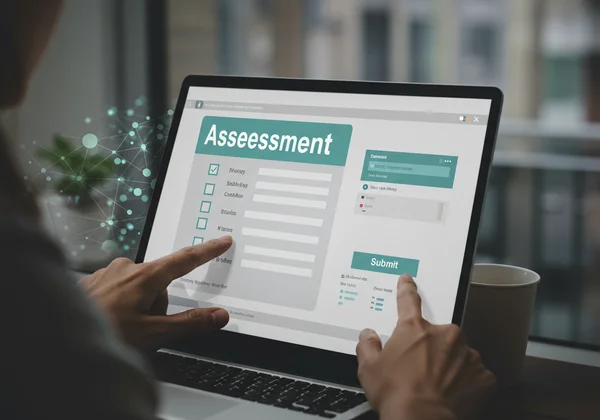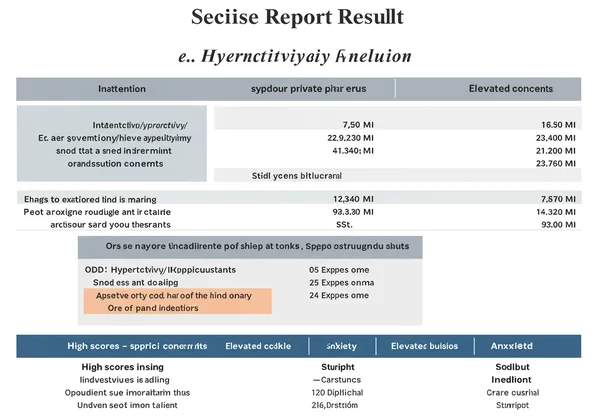Vanderbilt Assessment FAQs: Accuracy & Common Questions
Navigating concerns about your child's behavior can be daunting. The Vanderbilt Assessment is a widely recognized tool for ADHD screening, yet questions often arise about its purpose, accuracy, and how to interpret its results. This guide aims to answer those common questions, providing clear, reliable information to help you understand and effectively use this important first step in addressing potential behavioral health needs.
The journey to understanding a child's world begins with clear, reliable information. This guide will provide just that, helping you navigate your concerns with knowledge and support. For those ready to take that first step, you can find a convenient and confidential ADHD screening tool on our homepage.
What is the Vanderbilt Assessment, and How Does it Work Online?
The Vanderbilt Assessment Scale is a trusted questionnaire designed to help screen for Attention-Deficit/Hyperactivity Disorder (ADHD) in children. Developed by the National Institute for Children's Health Quality (NICHQ) and recommended by the American Academy of Pediatrics (AAP), it has become a standard tool for parents, teachers, and clinicians. It provides a structured way to gather information on a child’s behavior across different settings, which is essential for a comprehensive evaluation.
Our online platform makes this process simple and accessible. Instead of printing forms and scoring them by hand, you can complete the entire questionnaire through our secure website. The system instantly calculates the scores and provides an immediate summary report, taking the guesswork and hassle out of the process. This allows you to get clear, initial insights quickly and efficiently.

The Purpose of the Vanderbilt Assessment in ADHD Screening
It is critical to understand that the Vanderbilt Assessment is an ADHD screening tool, not a diagnostic test. Its purpose is to identify and flag specific behaviors and symptoms that may warrant further evaluation by a qualified healthcare professional. Think of it as a well-organized starting point—a way to collect data that can make your conversation with a doctor or psychologist more focused and productive. It helps answer the initial question: "Are my concerns about this child's behavior significant enough to seek professional advice?"
Understanding the Parent and Teacher Forms
A key strength of the Vanderbilt Assessment is its use of both a parent form and a teacher form. Children behave differently in different environments, and getting perspectives from both home and school is vital for a complete picture. The parent form gathers insights on behavior within the family setting, while the teacher form provides a view of the child’s conduct in the classroom, interaction with peers, and academic performance. Using both forms gives a more rounded and reliable overview of the child’s challenges and strengths. You can easily access both versions through our online Vanderbilt assessment.
Is the Vanderbilt Assessment Accurate and Reliable for Screening ADHD?
This is one of the most important questions for parents and educators. The Vanderbilt ADHD assessment is considered a valid and reliable screening instrument when used correctly. Its questions are based on the diagnostic criteria for ADHD as defined in the Diagnostic and Statistical Statistical Manual of Mental Disorders (DSM). Numerous studies have supported its effectiveness in identifying children who are at high risk for ADHD and should receive a more thorough clinical evaluation.
However, its accuracy depends on honest, thoughtful answers from the person filling it out and a clear understanding of its role. The scale’s reliability comes from its ability to consistently measure specific behavioral patterns over time. The results provide a snapshot that, when combined with other information, becomes a powerful tool for understanding.
The Validity and Limitations of the Assessment
The validity of this behavioral screening rests on its strong foundation in established clinical criteria. It effectively measures the frequency and severity of common ADHD symptoms. However, it has limitations. As a rating scale, it is subjective and relies on the perceptions of the person completing it. It cannot, by itself, determine the cause of the behaviors or rule out other underlying issues that might mimic ADHD symptoms. It is a guide, not a final answer, but an excellent starting point for a deeper look into a child's needs.

Why Professional Consultation is Essential After Screening
Emphasizing this point is crucial for responsible use of the tool: a screening result is not a professional diagnosis. After receiving your report, the single most important next step is to discuss the findings with a qualified professional, such as a pediatrician, child psychologist, or psychiatrist. Only a trained clinician can perform a comprehensive diagnostic evaluation, which may include a clinical interview, a review of developmental history, and potentially other assessments. The Vanderbilt report you receive from our free online assessment is designed to be the perfect document to bring to that appointment.
Interpreting a High Score on Your Vanderbilt Assessment Report
Receiving a report with elevated scores can be concerning, but it's important not to panic. What does a high Vanderbilt score mean? It signifies that the child is exhibiting a significant number of symptoms related to ADHD or other behavioral conditions at a frequency that is outside the typical range for their age. It is a clear indicator that a follow-up conversation with a professional is highly recommended. The score itself is not a label but rather a data point that suggests further attention is needed.
What Elevated Scores Might Indicate Beyond ADHD
One of the comprehensive features of the Vanderbilt Assessment is that it screens for more than just ADHD. It also includes questions related to other common co-occurring conditions. These include:
-
Oppositional Defiant Disorder (ODD): A pattern of angry/irritable mood, argumentative/defiant behavior, or vindictiveness.
-
Conduct Disorder (CD): More severe patterns of behavior that violate the rights of others or major societal norms.
-
Anxiety and Depression: Symptoms related to mood, worry, and emotional regulation. A high score in these areas provides a broader understanding that the child's challenges may be complex.

Next Steps After Receiving High Assessment Scores
If you receive high assessment scores, take a deep breath. You now have a clear starting point. The best next steps are to organize your thoughts and schedule an appointment with a professional. Use the report as a guide to articulate your concerns clearly. Our platform's optional AI-powered reports can provide even deeper, personalized analysis and action plans to help you prepare for this conversation and explore your results with greater confidence.
Can the Vanderbilt Assessment Be Used for Adults?
A common question is whether this tool is suitable for Vanderbilt assessment for adults. The simple answer is no. The NICHQ Vanderbilt Assessment Scale was specifically designed, validated, and normed for children. Its questions and scoring criteria are tailored to the behavioral and developmental context of childhood and adolescence.
Why the Vanderbilt Assessment is Designed for Children Aged 6-12
The assessment focuses on behaviors as they manifest in home and school environments, which are central to a child's life. The questions about "fidgeting in a seat," "interrupting others' games," or "completing homework" are directly relevant to the experiences of a school-aged child. These same questions do not accurately capture how ADHD symptoms present in adulthood, where challenges are more likely to appear in the workplace, financial management, and long-term relationships. The scoring is based on what is considered typical for child development, making it inappropriate for adults.

Alternative Screening Tools for Adult ADHD Concerns
For adults who suspect they may have ADHD, other validated screening tools are available. The Adult ADHD Self-Report Scale (ASRS) is a commonly used instrument designed to reflect the experiences of adults. If you are an adult with concerns, it is best to seek out a clinician who specializes in adult ADHD and can recommend the appropriate evaluation tools. Our mission is to provide the best possible resource for children, which means focusing on the tool designed specifically for them.
Empowering Parents and Educators: The Value of the Vanderbilt Assessment
Understanding the Vanderbilt Assessment is a crucial step for parents and educators concerned about a child's behavior. As a reliable screening tool—not a final diagnosis—the Vanderbilt Assessment empowers you with the knowledge and confidence to take effective next steps. It is a powerful first step toward gaining clarity and finding the right support for your child.
Ready to gain valuable insights? Our online platform provides instant, automatically scored results from the official NICHQ scale. For an even deeper understanding, you can explore our optional AI-powered reports, which offer personalized analyses tailored to your child's unique situation. Start your assessment today and take a positive step forward. We encourage you to share your thoughts or questions in the comments below.
Frequently Asked Questions About the Vanderbilt Assessment
Where can I find the official Vanderbilt parent or teacher form online?
You can access a convenient, easy-to-use version of both the official parent and teacher forms directly on our website. Our platform eliminates the need for printing and manual scoring by providing a seamless digital experience. Simply visit our homepage to get started now.
What specific conditions does the Vanderbilt Assessment screen for?
The Vanderbilt Assessment is most known for screening for all three presentations of ADHD (inattentive, hyperactive-impulsive, and combined). Additionally, it includes screening sections for common co-occurring conditions, including Oppositional Defiant Disorder (ODD), Conduct Disorder (CD), and Anxiety/Depression.
How is the Vanderbilt Assessment scored, and is it automatic online?
The manual Vanderbilt ADHD scale scoring guide involves a multi-step process of tallying scores for specific questions and checking them against impairment criteria. Our online tool completely automates this process. Once you complete the questionnaire, our system instantly calculates the scores for each section and provides a clear summary, saving you time and preventing potential errors.
Is a high Vanderbilt assessment score a definitive ADHD diagnosis?
No, absolutely not. A high score is an indication that a child's symptoms are significant enough to warrant a formal evaluation by a qualified healthcare professional. It is a screening result, not a diagnosis. The assessment provides valuable data to guide a clinical conversation but cannot replace a comprehensive diagnostic workup.
What age range is the Vanderbilt Assessment most appropriate for?
The Vanderbilt Assessment is specifically designed and validated for children aged 6 to 12. The questions and scoring benchmarks are based on the typical developmental and behavioral expectations for this age group, ensuring the results are relevant and meaningful for school-aged children.